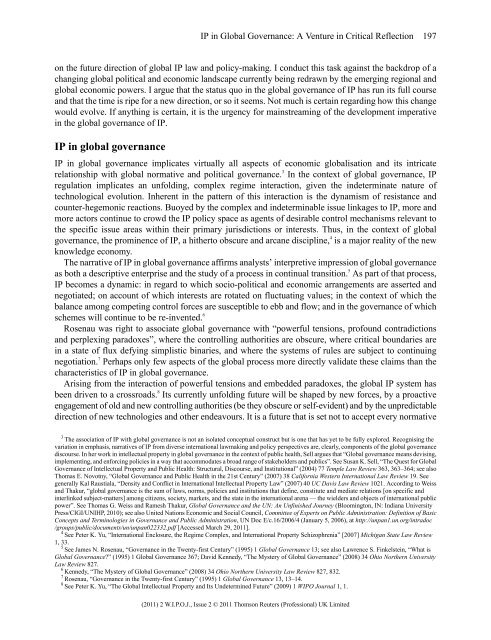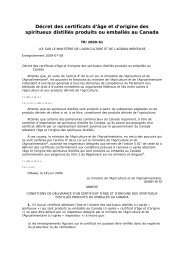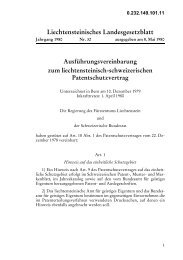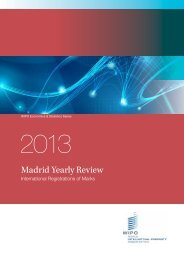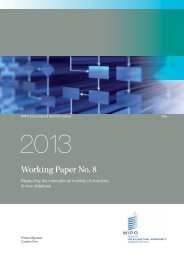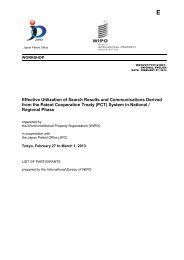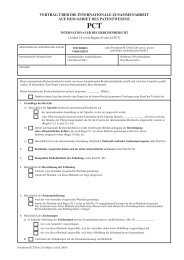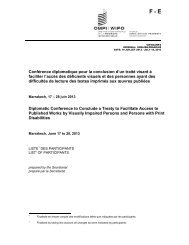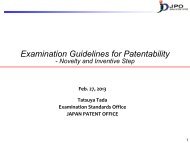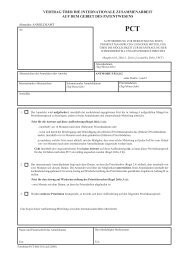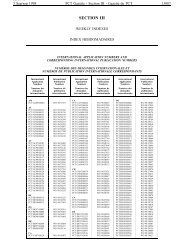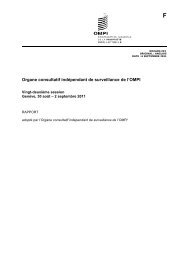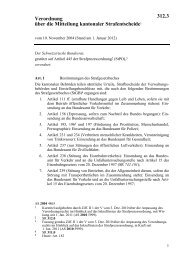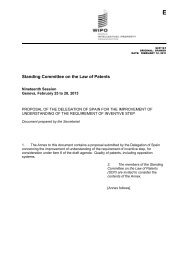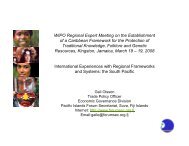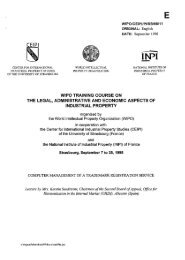WIPO Journal - World Intellectual Property Organization
WIPO Journal - World Intellectual Property Organization
WIPO Journal - World Intellectual Property Organization
You also want an ePaper? Increase the reach of your titles
YUMPU automatically turns print PDFs into web optimized ePapers that Google loves.
on the future direction of global IP law and policy-making. I conduct this task against the backdrop of a<br />
changing global political and economic landscape currently being redrawn by the emerging regional and<br />
global economic powers. I argue that the status quo in the global governance of IP has run its full course<br />
and that the time is ripe for a new direction, or so it seems. Not much is certain regarding how this change<br />
would evolve. If anything is certain, it is the urgency for mainstreaming of the development imperative<br />
in the global governance of IP.<br />
IP in global governance<br />
IP in Global Governance: A Venture in Critical Reflection 197<br />
IP in global governance implicates virtually all aspects of economic globalisation and its intricate<br />
relationship with global normative and political governance. 3 In the context of global governance, IP<br />
regulation implicates an unfolding, complex regime interaction, given the indeterminate nature of<br />
technological evolution. Inherent in the pattern of this interaction is the dynamism of resistance and<br />
counter-hegemonic reactions. Buoyed by the complex and indeterminable issue linkages to IP, more and<br />
more actors continue to crowd the IP policy space as agents of desirable control mechanisms relevant to<br />
the specific issue areas within their primary jurisdictions or interests. Thus, in the context of global<br />
governance, the prominence of IP, a hitherto obscure and arcane discipline, 4 is a major reality of the new<br />
knowledge economy.<br />
The narrative of IP in global governance affirms analysts’ interpretive impression of global governance<br />
as both a descriptive enterprise and the study of a process in continual transition. 5 As part of that process,<br />
IP becomes a dynamic: in regard to which socio-political and economic arrangements are asserted and<br />
negotiated; on account of which interests are rotated on fluctuating values; in the context of which the<br />
balance among competing control forces are susceptible to ebb and flow; and in the governance of which<br />
schemes will continue to be re-invented. 6<br />
Rosenau was right to associate global governance with “powerful tensions, profound contradictions<br />
and perplexing paradoxes”, where the controlling authorities are obscure, where critical boundaries are<br />
in a state of flux defying simplistic binaries, and where the systems of rules are subject to continuing<br />
negotiation. 7 Perhaps only few aspects of the global process more directly validate these claims than the<br />
characteristics of IP in global governance.<br />
Arising from the interaction of powerful tensions and embedded paradoxes, the global IP system has<br />
been driven to a crossroads. 8 Its currently unfolding future will be shaped by new forces, by a proactive<br />
engagement of old and new controlling authorities (be they obscure or self-evident) and by the unpredictable<br />
direction of new technologies and other endeavours. It is a future that is set not to accept every normative<br />
3<br />
The association of IP with global governance is not an isolated conceptual construct but is one that has yet to be fully explored. Recognising the<br />
variation in emphasis, narratives of IP from diverse international lawmaking and policy perspectives are, clearly, components of the global governance<br />
discourse. In her work in intellectual property in global governance in the context of public health, Sell argues that “Global governance means devising,<br />
implementing, and enforcing policies in a way that accommodates a broad range of stakeholders and publics”. See Susan K. Sell, “The Quest for Global<br />
Governance of <strong>Intellectual</strong> <strong>Property</strong> and Public Health: Structural, Discourse, and Institutional” (2004) 77 Temple Law Review 363, 363–364; see also<br />
Thomas E. Novotny, “Global Governance and Public Health in the 21st Century” (2007) 38 California Western International Law Review 19. See<br />
generally Kal Raustiala, “Density and Conflict in International <strong>Intellectual</strong> <strong>Property</strong> Law” (2007) 40 UC Davis Law Review 1021. According to Weiss<br />
and Thakur, “global governance is the sum of laws, norms, policies and institutions that define, constitute and mediate relations [on specific and<br />
interlinked subject-matters] among citizens, society, markets, and the state in the international arena — the wielders and objects of international public<br />
power”. See Thomas G. Weiss and Ramesh Thakur, Global Governance and the UN: An Unfinished Journey (Bloomington, IN: Indiana University<br />
Press/CIGI/UNIHP, 2010); see also United Nations Economic and Social Council, Committee of Experts on Public Administration: Definition of Basic<br />
Concepts and Terminologies in Governance and Public Administration, UN Doc E/c.16/2006/4 (January 5, 2006), at http://unpan1.un.org/intradoc<br />
/groups/public/documents/un/unpan022332.pdf [Accessed March 29, 2011].<br />
4<br />
See Peter K. Yu, “International Enclosure, the Regime Complex, and International <strong>Property</strong> Schizophrenia” [2007] Michigan State Law Review<br />
1, 33.<br />
5<br />
See James N. Rosenau, “Governance in the Twenty-first Century” (1995) 1 Global Governance 13; see also Lawrence S. Finkelstein, “What is<br />
Global Governance?” (1995) 1 Global Governance 367; David Kennedy, “The Mystery of Global Governance” (2008) 34 Ohio Northern University<br />
Law Review 827.<br />
6<br />
Kennedy, “The Mystery of Global Governance” (2008) 34 Ohio Northern University Law Review 827, 832.<br />
7<br />
Rosenau, “Governance in the Twenty-first Century” (1995) 1 Global Governance 13, 13–14.<br />
8<br />
See Peter K. Yu, “The Global <strong>Intellectual</strong> <strong>Property</strong> and Its Undetermined Future” (2009) 1 <strong>WIPO</strong> <strong>Journal</strong> 1, 1.<br />
(2011) 2 W.I.P.O.J., Issue 2 © 2011 Thomson Reuters (Professional) UK Limited


